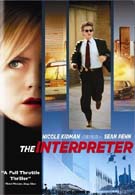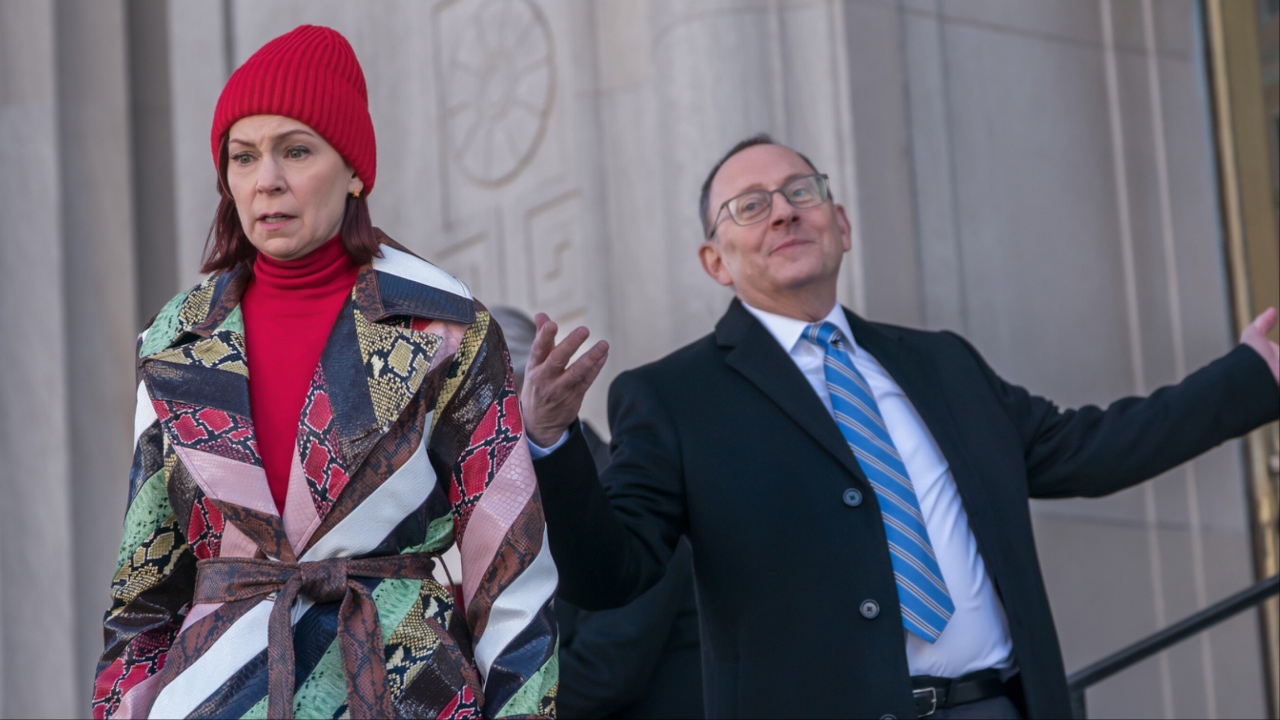It’s a rare event when a director can merge a thriller movie and a propaganda film into one without compromising either. The Interpreter is not wholly successful in its effort to tell a great story with a hefty socio-political moral, but as the brain child of genius storyteller Sydney Pollack it comes close. As the first commercial movie to ever be allowed access to the United Nations for filming, it’s something of a milestone project. On the other hand, the UN would never allow anyone such open access unless the filmmakers intended to show the global institution in nothing but the best political light. It kind of puts a damper on the story when it stops from time to insert the equivalent of PSAs for UN idealism. The nation of Matobo is just one more African country in political turmoil under the rule of a man whom key members of the United Nations want to bring to trial for crimes against humanity. The leader of that country, Edmond Zuwanie, is desperate to create support for his questionable regime. In a bold move he has declared his intention to visit the UN General Assembly to discuss his plans to improve conditions for his people. An interpreter (Nicole Kidman), one of few in the UN who speak the rare Matoban language “Ku”, overhears a potential death threat against Zuwanie. The Secret Service investigator looking into the matter (Sean Penn) begins to suspect that the interpreter herself may be in on the plot, but quickly finds himself torn between her suspicious history of violence and the peace loving person she has become.
The Interpreter bears a smart and intricate plot that commands your attention and may be too smart for its own good, where lazier viewers are concerned. Sydney Pollack knows how to spin a tale with careful pacing and a visual language that few use so poignantly. The characters each have a many threaded story, carefully woven so tight that the suspense is built in from the very start of the film. Pollack artfully unweaves each cord at just the right moment, revealing enough to keep the story moving without losing the tension. Unfortunately the entire film is pockmarked with painfully obvious sound bites for the kinds of lofty political idealism that the UN is meant to embody. They grind the dialogue to momentary stand stills, turning Pollack’s careful story work into messy knots. I was half expecting Keenen Ivory Wayans to walk into the shot and yell “message!”
Despite their annoying habit of breaking the mood with nips of preachiness, the director, writers and actors do a much better job with the bits of drama, carefully placed violence and occasional comic relief. Pollack knows exactly when his audience needs to chuckle, when they need to gasp and when they need to be stunned. None of the sadness, humor or shock is gratuitous. Instead it blends seamlessly in with the story, speaking in subtle ways to leave lasting effects on those watching. Too bad the use of political commentary couldn’t have been so effective. Of course, had it been too subtle the UN might not have allowed the movie to shoot in its hallowed corridors. That would have been a real shame.
The scenes filmed in the UN are spectacular, adding a level of credibility and a sense of wonder to the film. I felt like I was being treated to an insider’s look at the kinds of places not included on the normal visitor’s tour. There’s something grandiose and awe inspiring about the building’s internal architecture and the effect appears to have turned the actors performances up several notches. Pollack lets his visual brilliance soar as he works inside places like the General Assembly Chamber, and the result is rewarding to watch. It’s hard to say for sure, but I would guess the movie wouldn’t be anywhere near as good if it had been made on recreated sets.
Given the film’s moralistic overtones it’s not surprising to find the likes of Sean Penn playing the lead. Thankfully there are no weepy, half-hour long dramatic monologues for Penn to practice his Oscar mugging. Nevertheless, he still gets to revel in the kind of idealistic diatribes that no one is interested in enduring from him in the real world. Whether he’s somehow reconnected with the grounded actor he used to be or simply satiated by the heady, cliché tirades spouted by his character, Penn seems energized by the role and is quite enjoyable to watch. Likewise, Kidman absolutely immerses herself in her character who happens to be, in every sense, the very spirit of the UN incarnate. Penn and Kidman enjoy a chemistry that works on a psychological level, if not emotional. Even though they would never be able to pair in a drama or romantic comedy, they mesh perfectly here.
Pollack and his team practically invented an entire new language for the Ku people and the fictional nation of Matobo. In the film they go even further to create the culture and political nuances behind it. It’s the perfect background for a thriller movie and Pollack twists and turns it for all it’s worth. If it weren’t for the occasional preachiness this would be a flawless notch on Pollack’s already impressive belt. As it is, we just have to take the bad with the good and be glad Sean Penn won’t be getting any Academy nominations out of it. Pollack is a consummate filmmaker and this DVD release reflects his passion for the art. Among the bonus features are a director’s commentary, a look at what it was like being the first to film in the UN, and a defense of his choice to shoot with wide screen format in a world where pan and scan regularly defiles the hard work of directors who make that choice.
The deleted scenes and a brief alternate ending are offered up as simple bonuses, taking up very little time and getting very little ado. It’s nice to have them there and they’re interesting to watch, but they’re not the same kind of thing you see in most DVDs. Usually the extra scenes and endings reflect what the director would have liked to have included but had to cut for time. Not Pollack. He included everything he wanted and what’s left seem to be simple possibilities that he toyed with but didn’t think were the right direction for his story.
There’s a brief look at the experience that was being the first commercial film team permitted to work on the international soil of the UN. Pollack begins the story with his interesting efforts to gain access by meeting personally with Secretary General Annon. From there it’s just one glowing face after the next. Producers, actors, directors and crew all amazed and excited over the joys and stresses of filming in such an amazing structure with such a unique history and energy. It’s also fitting that a movie about a UN interpreter would include a featurette about the real thing. Actual interpreters who collaborated with Pollack to bring a level of reality to the film spend a little time talking about their trade.
Mr. Pollack takes three opportunities to talk about the ups and downs of being a director. The “ups” are covered in a featurette about his favorite part of the process: editing. Apparently he enjoys working with actors but likes it even more when they just go away and he can do what he really wants. Just as entertaining is listening to him discuss the “downs” of choosing to work in widescreen format. He unabashedly complains about directors’ work being credited to them despite the fact that someone else has forced the movie into a full screen format, completely changing the quality and visual nature of the film. I have to agree with him. Many people, in ignorance I might add (not their fault - they don’t know any better) prefer to watch a movie without those black bars on top and bottom, thinking part of the image has been blocked out. In truth it’s quite the opposite. By changing the image to fill the screen, parts of the image on the end are being cut off, a process called panning and scanning. I don’t care for it. Pollack hates it, and he makes a very persuasive argument. Ironically The Interpreter is for sale both in full screen and widescreen versions. Pollack gets in his final and most exhaustive word on the creative process in his film commentary. He has a lot to share about the making of the movie, but his dry tone may quickly bore those who aren’t interested in the nitty gritty details.
The DVD’s features are relatively brief in nature but they cover a wide range of interesting topics. The movie is enjoyable and will hold a special place in the heart and on the video shelf of people who like to hear the political message of the UN interjected every few minutes. Non Sean Penn fans, feel free to rent.
I Thought Elsbeth's Bloody Judge Crawford Twist Had To Be A Fake Out, But Now I Have Questions For The Season 2 Finale
A24’s The Legend Of Ochi Hired A YouTuber Making Bird Sounds In His Basement To Work On The Movie, And I'm Wowed By The Whole Process
Charli XCX Is Not Going To Be In Greta Gerwig's Narnia Movie After All, But I'm Psyched That We're Still Getting A Barbie Reunion Thanks To New Casting











